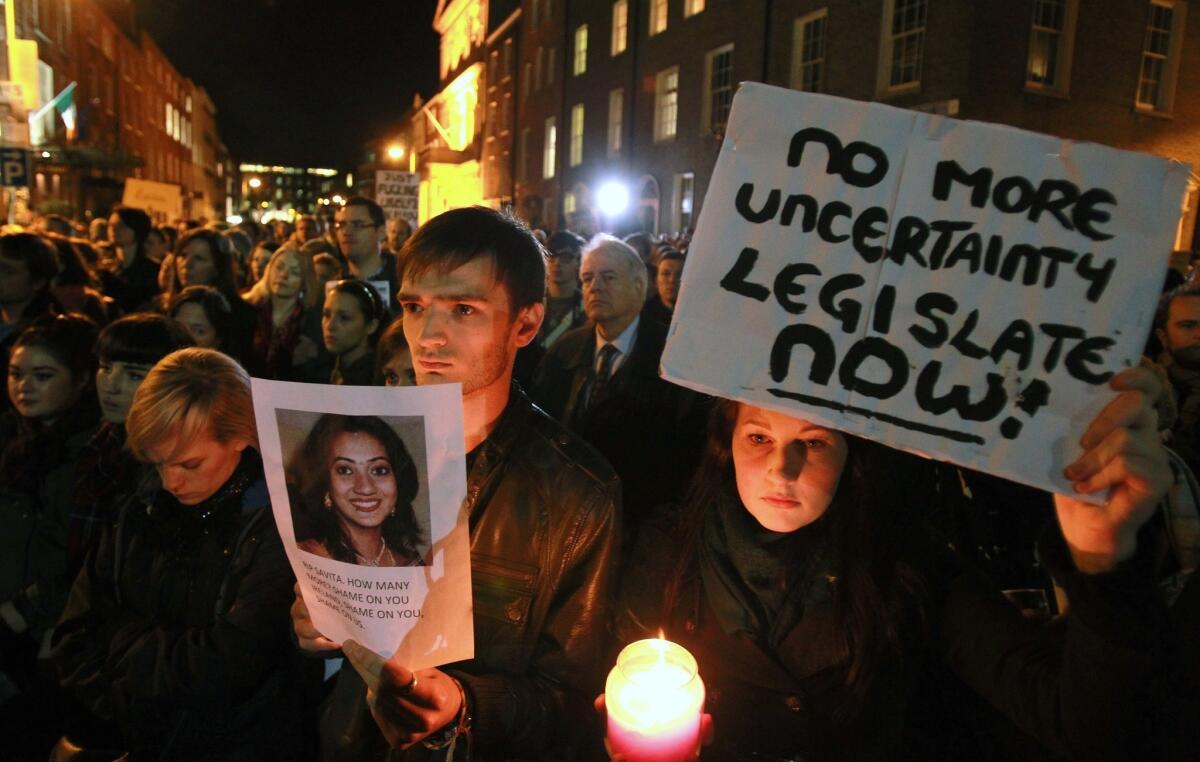Ireland to seek change in abortion law after woman’s death

The Irish government announced Tuesday that it would draft new laws and regulations to spell out when doctors can terminate a pregnancy, weeks after an ailing woman was refused an abortion and perished.
Exactly what rules will be proposed is still unclear, but activists celebrated the move as the first step toward addressing the legal confusion over abortion in the largely Roman Catholic country.
“We can see our government will be taking this issue seriously,” said James Burke, a member of the Termination for Medical Reasons Ireland campaign. “It’s definitely a step forward.”
Debate over abortion rules exploded last month after the death of Savita Halappanavar, whose husband told the Irish Times that doctors would not allow an abortion even after his sickened wife was told her baby would not survive. Halappanavar miscarried days later and died soon afterward. Her death is under investigation.
Abortion is already supposed to be legal in Ireland when the life of the mother is in danger. Its highest court handed down the ruling decades ago, enshrining a key exception to its constitutional ban on abortion. But Irish officials have never set forward clear regulations or guidelines for doctors, a politically sensitive topic.
Critics say the legal limbo makes physicians reluctant to abort even when mothers are at risk. The European Court of Human Rights ruled two years ago that Ireland had failed to protect the lives of women and needed to clear up its abortion rules to comply with European Union law.
Halappanavar, an Indian dentist who longed to be a mother, became the face of the movement after her death, which spurred thousands of protesters to pour onto the streets of Dublin chanting “Never again!” Abortion opponents have countered with ad campaigns against any law permitting the procedure, saying it would end up allowing all kinds of terminations.
In a Tuesday statement, the government said it would draft new legislation and regulations to “provide the clarity and certainty in relation to the process of deciding when a termination of pregnancy is permissible, that is where there is a real and substantial risk to the life, as opposed to the health, of the woman.”
Hearings will be held next month before a bill is drafted. “Today the government has decided the form of action to be taken,” Health Minister James Reilly said in the statement. “We will not preempt the debate that must follow by speculating on details to be decided later in the process.”
The government is still unlikely to press for the broader changes that Burke and his fellow activists are seeking, which would allow abortions when a fetus is unable to survive outside the womb. So far, the government talks have centered only on cases where the pregnant mother may die, not those where the baby is at risk or the mother’s health could be compromised.
But after the furor over Halappanavar, “people now know there are gray areas,” Burke said. “We hope it opens the door to more discussion in the future.”
Opponents contend that allowing any kind of abortion is a slippery slope. “Once it is conceded that some human lives may be directly targeted there is no going back,” Ruth Cullen of the Pro-Life Campaign said ahead of the government announcement.
The campaign plans to challenge “each and every element” of the proposed laws, it said. One legal area that may be especially controversial among Irish legislators is whether suicide can be considered a risk to the life of the mother, the heart of a previous Irish legal case.
ALSO:
Russian warships head toward Syria
Congo rebel leader acquitted on war crimes charges
South Africa leader Jacob Zuma wins second term as ANC chief
More to Read
Sign up for Essential California
The most important California stories and recommendations in your inbox every morning.
You may occasionally receive promotional content from the Los Angeles Times.










